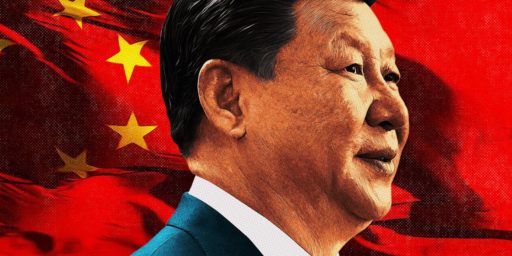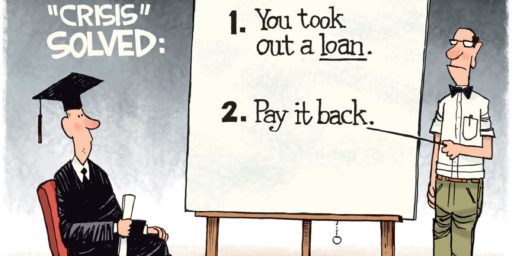Blue Ribbon Politics
Cal Thomas has an interesting idea about what Republicans should do if, as seems increasingly likely, they find themselves in the minority after the November midterm elections.
Republicans should assemble a bipartisan group of former members of Congress, such as Georgia Democrat Sam Nunn and Missouri Republican John Danforth. They would be commissioned to draft a bipartisan team to find solutions to common problems and challenges, such as a general framework for when American forces would be committed abroad and for what purposes. The team could also attack poverty in ways politicians have not, largely because each side is beholden to its “base,” which won’t let them stray far from past practices.
They can start by considering the ideas of this year’s Nobel Peace Prize winner, Muhammad Yunus. Yunus, a Bangladeshi banker, founded and heads Grameen Bank, which offers “micro-credit” to the very poor. Since 1983, when the bank was founded, more than half of its borrowers have climbed out of poverty.
In a recent Wall Street Journal column, Yunus expresses a philosophy that sounds Republican. He offers, “small loans packaged with practical business and social advice.” The Democratic Party philosophy is to give the poor more government aid. Republicans, when they think of the poor, believe they should emerge from poverty on their own initiative. With micro-credit, Yunus says the poor become self-sufficient and acquire dignity because they must repay the loans. He says nearly 99 percent of the loans are repaid. If Yunus can make it work in Bangladesh, it should work in America.
Republicans need to try something dramatic that will demonstrate success and communicate to the public whose interests they actually serve. If they do lose their majority next month, but learn the greater lesson that power should be a means to success, not an end in itself, they will not be the first party or person to learn more from failure than from success.
It seems highly unlikely that micro-lending would scale from Bangladesh to America. After all, $20 doesn’t go very far in these parts and it would be much harder to make a living here renting time on one’s cell phone, what with everyone above the age of six seemingly having their own and an economy where it would be difficult to get by on less than $25,000 a year.
Still, the idea that blue ribbon committees of greybeards can come up with novel ways of solving problems that everyone would then agree on has long had great appeal. It’s intuitively satisfying, after all. Surely, if we would just put politics aside, we’d all agree on the way ahead.
It turns out, however, that the world doesn’t work that way. For one thing, if a solution that emerged that was so uncontroversial as to catch fire, both parties would promptly announce that they were in favor of it and attempt to take credit for it. More likely, though, ideas that came out of the committee would be so watered down by compromise that they would either be unworkable or would spawn alternative proposals that hew to more traditional ideological lines.
Thomas’ central point, that holding power should not be more important to politicians and parties than actually putting one’s policy preferences into effect, is a good one. Inevitably, however, the former takes precedence over the latter once a party has been in office more than a few years. The initial enthusiasm about policy ultimately peters out because the best ideas get adopted early and the hard ones can’t get past political roadblocks.
The solution, generally forced upon the moribund party by the electorate, is some time in the minority. The way back, though, is not bipartisan committees of Yoda-like gurus but rather new blood and fresh ideas. Both parties have think tanks, magazines, and young leaders waiting in the wings to generate these ideas. That’s ultimately much more productive than dusting off Jim Baker and Sam Nunn every few years.






I hate all these damn “special committees” whenever or whoever proposes them. We elect Congresscritters and Senators to make those choices – not to hide behind people who are not accountable to the voters.
Whether it be Social Security, Medicare, base closings, wartime issues, crime, whatever, I just want representatives who will do their damn job.
Yeah, that’s pretty funny. Why didn’t the GOP figure out they were supposed to govern when they controlled congress? Why the “flash of the obvious” now? Special commissions for what?
Reminds me of the Defeatocrats wanting to talk to the enemy so that they can stop the war. In the arena of ideas, you don’t win by concensus, you win by beating the crap out of your opponent in a free marketplace.
Holy crap, Cal! You mean the Republicans should set up a special committee to do… what Congress is supposed to do to begin with? The GOP has sat on its butt the last few years, refusing to perform oversight, ignoring major policy questions, and in general, doing exactly nothing of interest to 99% of all Americans. the fact that an insufferable prick like Thomas thinks that _now_ they should do something useful is just another indictment of the current power structure.
People forget that part of being the party in power is not only doing something but also keeping other things from getting done.
The Republicans didn’t do all they should have done. I’m as disappointed as anyone about that but by retaining power they kept Democrats from enacting stupid legislation that would damage the country. I know, give specifics. For example we know Dems would like to increase taxes, increase environmental regulations, and certainly bail on Iraq. By keeping the majority and the presidency the Republicans keep those ideas in check.
Sometimes the politics of obstruction are a good thing.
I certainly agree with many that these sorts of blue ribbon groups are dumb. That’s why we elect who we elect, to make decisions.
Essentially all our elected representatives know what they want to do they are just seeking cover to do it. Grow some guys, get it done and let the chips fall where they may.
Oh, you mean like passing the Medicare prescription program and the “Highway to Nowhere” Bill?
DCL – Seriously. I mean, the GOP put in Bush’s tax cuts to “help” big business. OK, business is good. But has that translated to anything good for America? The stock market is up and coprorate profits are setting records – as is senior exec salary. But Worker salaries are stagnated, consumer confidence is limp, employment numbers stink most every single month, an accelerating number of people are in poverty and un-covered by health insurance… Tell me again Steven – what exactly has the Republican Congress done that’s actually helped America and Americans?
All they’ve done is blindly assume that giving huge lumps of cash to their cronies will eventually result in average Americans’ getting a tiny scrap, but even that scrap has vanished. And people are finally starting to notice…
Dems would like to increase taxes, increase environmental regulations, and certainly bail on Iraq
Let’s see: higher taxes are needed to pay for the war; env’t’l regs are arguably needed; and “bailing” on Iraq is, last time I checked, not only a good idea but a popular one.
Good thing the Dems haven’t been able to enact the stupid laws that America wants.
Bush’s tax cut is lessening the deficit at an increased pace. Environmental regulations are arguably excessive and impede economic growth. Popular ideas are not always the right way to govern or conduct a war. Last I checked the prescription drug benefit was a bipartisan affair. The “bridge to nowhere” is as shameful as it gets but to be fair both sides of the aisle pack the pork.
We’re going to disagree on a lot of this stuff but surely you can see why a conservative would prefer the GOP even if they didn’t get more done.
Just saying the Dems can do better doesn’t sway me at all. Perhaps it will not sway the voters in November.
“Bush’s tax cut is lessening the deficit at an increased pace.”
Wow, thats an amazing spin. There was no budget deficit when Bush took over. He passed the tax “cuts” (actually deferals) and created the deficits. Now the size of the deficit is fading somewhat. But the bottom line, of course, is that over a trillion dollars of debt has been transferred from the greedy adults to their children.
“Environmental regulations are arguably excessive and impede economic growth.’
Arguable? Anything is arguable, given motivation and rhetorical ability. Doesn’t make it true though.
“Popular ideas are not always the right way to govern or conduct a war.”
The “right way”? Is there some objective standard as to what is right, in terms of policy? Do you speak from the perspective of having some special insight into objective truth? In a democratic system, in which the people rule, what is right is what the people want (within the framework of constitutionality, of course).
James:
Really? Because your lead in to Thomas’ article seems to read that he is advocating trying to put one’s policy into effect only AFTER you have lost power. That implies that while IN power, the Republicans should not put policy before power. It’s easy to risk what you’ve already lost.
Steven:
Quite right, there are many forms of government that are not directed by the want of the majority. Thankfully, I don’t live in one of those, nor do I want to.
Michael: Thomas is presumably accepting that it’s unlikely this would happen if the Republicans win in November.
James,
And what does that tell you about both his and your unspoken opinion about your own party? It’s no wonder polls are showing fewer and fewer Republicans as “likely voters” this November.
The Big Guy and Gov. Land-Grab have stomped the campaign trail into a mud pit. But there are plenty of other candidates vying for public office this year in Georgia. Creative Loafing interviewed many and got the phone slammed down on them by others. The results: CL’s most comprehensive endorsement issue ever.
Read Clash of the Titans